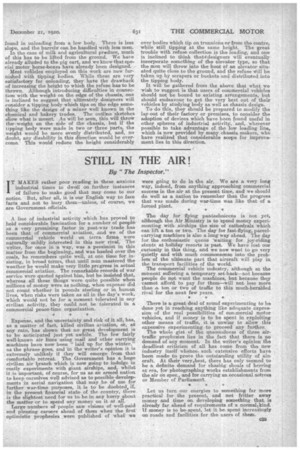STILL IN THE AIR!
Page 19

If you've noticed an error in this article please click here to report it so we can fix it.
By "The Inspector."
IT MAKES rather poor reading in these anxious industrial times to dwell on further instances of failure to make good that may come to our notice. • But, after all, it is our English way to face facts and not to bury them—unless, of course, we are Government officials.
A line of industrial activity ,which has proved to hold considerable fascination for a number of people, as a very promising factor in post-war trade has been that of commercial aviation, and we of the commercial vehicle world on terra firma were naturally mildly interested in this new rival. The writer, for once in 'a way, was a pessimist in this matter from the beginning,, and was hauled over the coals, he remembers quite well, at one time for insisting, in broad terms, that until man mastered the weather he would make very little progress in actual commercial aviation. The remarkable records of war service were quoted against him, but he insisted that, whereas all these things were quite possible when millions of money were as nothing, when expense did not count whether in pounds sterling or in human lives, when risks were taken as all in the day's work, which would not Ise for a moment tolerated in any civilian activity, they could not be tolerated in a commercial peace-time organization. .
Expense, and the uncertainty and risk of it all, has, as a matter of fact, killed civilian aviation, or, at any rate, hats shown that no great development is to be anticipated just yet awhile. The few fairly well-known air lines using mail and other carrying machines have now been "laid up for the winter," as the phrase goes, and in the writer's opinion it. is extremely unlikely if they will emerge from that comfortable retreat. The Government ha,s a huge civilian air branch which is now going to indulge in costly experiments with giant airships, and, whilst it is important, of course, for us as an armed nation to keep ourselves Well advised as to possible developments in aerial navigation that may be of use for further war-time purposes, it is to be doubted4 if, in the present financial state, of the country, there is the slightest need for us to be in any hurry about the matter or to spend any money on it at. all. Large numbers of people saw visions of well-paid and pleasing careers ahead of them when the first optimistic prophesies were published of what we were going to do in the air. We are a very long way, indeed, from anything approaching commercial success in the air at the present time, and we should do well as a nation to remember that the progress that was made during wax-tirne was like that of a forced plant.
The day for flying pantechnicens is not yet, although the Air Ministry is to spend money experimenting with airships the size of cathedrals which can lift a ton or two. The day for fast-flying, parcelcarrying machines is also a long way ahead. The day for the enthusiastic queue -waiting for joy-riding stunts at holiday resells is past. We have lost our curiosity in this thing, and we now want to go very 'quietly and with much commonsense into the problem of the ultimate part that aircraft will play in the transport facilities of the world.
The commercial vehicle industry, although at the moment suffering a temporary set-back—not because people do n5at want the machines, but because they cannot afford to pay for them—will not lose more than a tan or two of traffic to this much-heralded rival for the next few years.
There is a great deal of sound experimenting to be dime yet in reaching anything like adequate expression of the real possibilities of commercial motor vehicles, and if money is to be spent in exploiting other means of traffic, it is unwise to allow this expensive experimenting to proceed any further.
The whole gist of the unsoundness of these airtraffic prophesies lies in the fact that there is no demand of any moment. In the writer's opinion the deadliest criticism of all has come from the new industry itself whence, such extensive efforts have been made to prove the outstanding utility of airs craft. At their very,best, there has only seemed to be a definite demand for chasing shoals of herring at sea, for photographing works establishments from the air On spec., and for carrying an occasional actress or Member of Parliament.
Let us turn our energies to something far more practical for the present, and not fritter away money and time on developing something that, is already far ahead of requirements of a normaltkind. If money is to be spent, let it be spent increasingly on roads and facilities for the users of them.
































